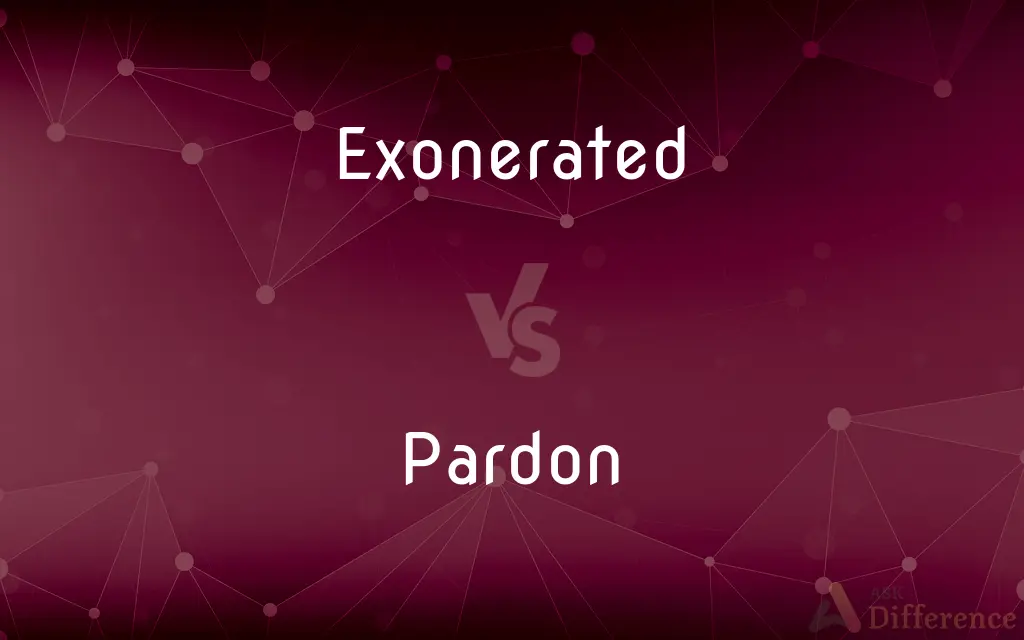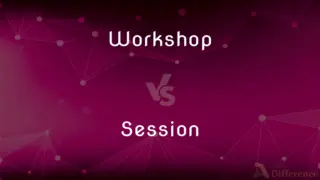Exonerated vs. Pardon — What's the Difference?
By Tayyaba Rehman & Fiza Rafique — Updated on April 19, 2024
Exoneration involves proving someone's innocence, typically after a conviction has been overturned due to new evidence. A pardon, however, is the forgiveness of a crime by a figure of authority and does not imply innocence.

Difference Between Exonerated and Pardon
Table of Contents
ADVERTISEMENT
Key Differences
Exoneration clears an individual's name from any blame, usually after new evidence suggests no involvement in the crime they were accused of. This legal action declares the person was wrongly convicted, restoring their reputation as if they were never guilty. On the other hand, a pardon is granted by a government official or authority, often a president or governor, and releases the person from the penalties associated with a conviction. While a pardon forgives the crime, it does not necessarily remove the conviction from the individual’s record nor does it imply that they were wrongly accused.
The process of exoneration can be lengthy and complex, often involving appeals, new evidence, and sometimes the reexamination of cases by innocence projects or legal aid organizations. Pardons, however, are more straightforward and are typically based on discretion rather than proof, influenced by factors like mercy, rehabilitation, or political considerations.
Exonerations are often publicized in the media due to their nature of correcting judicial mistakes, highlighting issues in the legal system. Pardons may also be highly visible, especially if they are controversial, but they are generally seen as acts of clemency rather than judicial corrections.
In terms of legal effects, exoneration can allow an individual to completely disassociate from any criminal implications of their past, often making them eligible for compensation for wrongful convictions. Pardons might relieve certain legal consequences but do not offer the same level of restitution since the conviction remains valid, even if the penalties are set aside.
Socially, being exonerated can restore a person's social standing and credibility completely, as it affirms their innocence. Being pardoned, however, may still leave some societal stigma, as the original conviction is acknowledged but forgiven, leaving room for public doubt.
ADVERTISEMENT
Comparison Chart
Definition
Proof of innocence and removal of blame
Forgiveness of a crime by authority
Legal Implication
Clears criminal record
Does not remove conviction
Basis
New evidence, wrongful conviction
Mercy, political motives, rehabilitation
Effect on Reputation
Restores as if never guilty
May still carry some stigma
Common in
Judicial errors corrected
Acts of clemency, often political
Compare with Definitions
Exonerated
Cleared from accusation or blame.
The new DNA evidence exonerated him after ten years in prison.
Pardon
Official forgiveness for a crime.
The governor granted him a pardon on the basis of his reform behavior.
Exonerated
Vindicated through legal or factual evidence.
The overturned verdict exonerated the accused.
Pardon
Legal act relieving someone from the penalties of an offense.
She received a pardon and was released from further obligations to the court.
Exonerated
Freed from any charges due to proof of innocence.
After his exoneration, he worked to support wrongful conviction reforms.
Pardon
An act of grace by a leader or authority.
The president’s pardon was part of a broader criminal justice reform.
Exonerated
Declared not responsible for a crime.
She was exonerated when the real perpetrator confessed.
Pardon
A declaration of forgiveness and freedom from punishment.
He sought a pardon to restore his civil rights.
Exonerated
Released from the responsibility or duty because proved not guilty.
Exonerated from the charges, he resumed his career.
Pardon
Relief from penalties without implying innocence.
Despite the pardon, the public still debated his guilt.
Exonerated
To free from blame.
Pardon
A pardon is a government decision to allow a person to be relieved of some or all of the legal consequences resulting from a criminal conviction. A pardon may be granted before or after conviction for the crime, depending on the laws of the jurisdiction.Pardons can be granted in many countries when individuals are deemed to have demonstrated that they have "paid their debt to society", or are otherwise considered to be deserving of them.
Exonerated
To free from a responsibility, obligation, or task.
Pardon
The action of forgiving or being forgiven for an error or offence
He obtained pardon for his sins
Exonerated
Freed from any question of guilt, acquitted.
Pardon
Forgive or excuse (a person, error, or offence)
I know Catherine will pardon me
Exonerated
Same as exculpated.
Pardon
A request to a speaker to repeat something because one did not hear or understand it
‘Pardon?’ I said, cupping a hand to my ear
Exonerated
Freed from any question of guilt;
Is absolved from all blame
Was now clear of the charge of cowardice
His official honor is vindicated
Pardon
To release (a person) from punishment or disfavor for wrongdoing or a fault
A convicted criminal who was pardoned by the governor.
Pardon
To allow (an offense or fault) to pass without punishment or disfavor.
Pardon
To make courteous allowance for; excuse
Pardon me, I'm in a hurry.
Pardon
The act of pardoning.
Pardon
Exemption of a convicted person from the penalties of an offense or crime by the power of the executor of the laws.
Pardon
An official document or warrant declaring such an exemption.
Pardon
Allowance or forgiveness for an offense or a discourtesy
Begged the host's pardon for leaving early.
Pardon
Roman Catholic Church An indulgence.
Pardon
Forgiveness for an offence.
Pardon
(legal) An order that releases a convicted criminal without further punishment, prevents future punishment, or (in some jurisdictions) removes an offence from a person's criminal record, as if it had never been committed.
Pardon
(transitive) To forgive (a person).
Pardon
(transitive) To refrain from exacting as a penalty.
Pardon
To grant an official pardon for a crime.
Pardon
Often used when someone does not understand what another person says.
Pardon
The act of pardoning; forgiveness, as of an offender, or of an offense; release from penalty; remission of punishment; absolution.
Pardon, my lord, for me and for my tidings.
But infinite in pardon was my judge.
Pardon
An official warrant of remission of penalty.
Sign me a present pardon for my brother.
Pardon
The state of being forgiven.
Pardon
A release, by a sovereign, or officer having jurisdiction, from the penalties of an offense, being distinguished from amnesty, which is a general obliteration and canceling of a particular line of past offenses.
Pardon
To absolve from the consequences of a fault or the punishment of crime; to free from penalty; - applied to the offender.
In this thing the Lord pardon thy servant.
I pray you, pardon me; pray heartily, pardon me.
Pardon
To remit the penalty of; to suffer to pass without punishment; to forgive; - applied to offenses.
I pray thee, pardon my sin.
Apollo, pardonMy great profaneness 'gainst thine oracle!
Pardon
To refrain from exacting as a penalty.
I pardon thee thy life before thou ask it.
Pardon
To give leave (of departure) to.
Even now about it! I will pardon you.
Pardon
The act of excusing a mistake or offense
Pardon
A warrant granting release from punishment for an offense
Pardon
The formal act of liberating someone
Pardon
Accept an excuse for;
Please excuse my dirty hands
Pardon
Grant a pardon to;
Ford pardoned Nixon
The Thanksgiving turkey was pardoned by the President
Common Curiosities
How does exoneration affect a person’s criminal record?
Exoneration typically results in the removal of the conviction from a person's criminal record, effectively treating them as if they had never been found guilty.
Why might someone receive a pardon?
Pardons are generally granted for reasons of mercy, rehabilitation evidence, the public good, or sometimes political motivations.
Can a pardoned person still be considered guilty?
Yes, a pardon does not erase the fact of the conviction; it merely forgives and nullifies the penalties. The individual's legal record may still reflect the conviction.
What role do innocence projects play in exoneration?
Innocence projects are legal organizations that work to overturn wrongful convictions primarily through the use of new evidence, often focusing on DNA evidence.
Are there limitations on who can receive a pardon?
Limitations depend on the laws of the specific jurisdiction but generally, most convicted individuals are eligible to apply for a pardon, except in cases of impeachment.
What does it mean to be exonerated?
Being exonerated means being officially cleared from any legal blame or responsibility for a crime, often after new evidence proves innocence.
What are the common reasons for exoneration?
Common reasons include new evidence, such as DNA proof, that conclusively demonstrates the innocence of the convicted person.
Can a pardon be revoked?
Generally, once a pardon is granted, it is irreversible, barring exceptional circumstances or new findings that could challenge the basis of the pardon.
What kind of compensation might be available for those who are exonerated?
Many jurisdictions provide compensation for wrongful convictions, which may include monetary payments, reintegration support services, and sometimes public apologies.
What is a pardon in legal terms?
A pardon is an act of clemency where an authority forgives a person for their crimes and frees them from the legal penalties associated with the conviction.
How is public perception affected by exoneration versus a pardon?
Exoneration tends to restore a person’s reputation completely, as it affirms their innocence, whereas a pardon may leave some public doubt since the guilt was acknowledged but forgiven.
How does society typically react to high-profile exonerations or pardons?
Society's reactions can vary widely, from relief and support for exonerations to controversy and debate over pardons, particularly if the circumstances are politically charged.
What are the long-term impacts of being exonerated or pardoned?
Long-term impacts include restoration of rights, potential changes to public record, and personal and societal perception shifts, with exoneration often leading to a clearer restoration of personal and social identity than a pardon.
Is exoneration the same as acquittal?
No, exoneration usually occurs post-conviction and involves clearing someone’s name based on new proof of innocence, while an acquittal occurs when there is insufficient evidence to convict in the first place.
How does the process of granting a pardon work?
The process varies by country and legal system but typically involves a formal application to a governor, president, or similar authority, who has the power to grant pardons based on various considerations.
Share Your Discovery

Previous Comparison
Workshop vs. Session
Next Comparison
Pigeon vs. SquabAuthor Spotlight
Written by
Tayyaba RehmanTayyaba Rehman is a distinguished writer, currently serving as a primary contributor to askdifference.com. As a researcher in semantics and etymology, Tayyaba's passion for the complexity of languages and their distinctions has found a perfect home on the platform. Tayyaba delves into the intricacies of language, distinguishing between commonly confused words and phrases, thereby providing clarity for readers worldwide.
Co-written by
Fiza RafiqueFiza Rafique is a skilled content writer at AskDifference.com, where she meticulously refines and enhances written pieces. Drawing from her vast editorial expertise, Fiza ensures clarity, accuracy, and precision in every article. Passionate about language, she continually seeks to elevate the quality of content for readers worldwide.













































